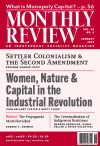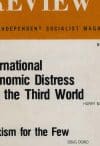Marxism

To understand the present ecological crisis, it is necessary to dig much deeper into capitalism’s logic of expropriation, as first delineated by Marx during the Industrial Revolution. At the root of the problem is a spoliation of the natural environment—the expropriation of the earth itself. | more…

How Capital Extracts Value Beyond Wage Labor
An expanded Marxist understanding of capitalist exploitation is long overdue. There are many pathways of surplus extraction beyond the wage form, and understanding them is a task with profound implications for anticapitalist movements around the world. | more…

In his timely new book, David Gilbert addresses a subject that could not be more relevant: the white working class in the United States. He brings a much-needed historical perspective to current debates around the politics and identity of white workers, then and now. | more…

The state cannot be other than Leviathan in imposing its structurally entrenched power on overall societal decision-making. Yet a way must be found to extricate humanity from the ever more dangerous, arbitrary, and alienated form of the Leviathan state. Indeed, the survival of humanity depends on it. | more…

Sara Farris’s In the Name of Women’s Rights is a brave monograph that analyzes the way that the discourses of Europe’s right-wing nationalists, government agencies, and liberal feminists converge in their representations of Muslim and non-western immigrant women, relegating these communities to commodified spheres of social reproductive work. | more…

For years, intellectuals have argued that, with the triumph of capitalist, liberal democracy, the Western World has reached “the end of history.” Recently, however, there has been a rise of authoritarian politics in many countries. Concepts of post-democracy, anti-politics, and the like are gaining currency in theoretical and political debate. Now that capitalist democracies are facing seismic and systemic challenges, it becomes increasingly important to investigate not only the inherent antagonism between liberalism and the democratic process, but also socialism. Is socialism an enemy of democracy? Could socialism develop, expand, even enhance democracy? | more…

The recent rise of social reproduction theory represents one of the most remarkable attempts to extend historical materialism in our time. The Review of the Month in this issue, “Women, Nature, and Capital in the Industrial Revolution,” is intended as a contribution to this rapidly growing body of work. | more…

Examining the historical specificity of women’s lives and labor in England during the Industrial Revolution allows us to better analyze the assumptions regarding gender, family, and work that informed the writings of Marx and Engels—and ultimately to understand how capital as a system threatens the social and ecological bases of human life. | more…

István Mészáros, who died on October 1 at the age of eighty-six, was a leading Marxist theorist and a frequent contributor to MR. No political philosopher of our age has reached nearly so far in joining philosophy with political-economic critique, or in systematically addressing the question of the movement toward socialism. | more…

The political ineffectuality of Marxism in the United States is the consequence most importantly of the nature and history of U.S. capitalism. But also important in explaining this feebleness is what Marxists have and have not done, who they are, and their “style.” | more…

Forthcoming in November 2018
This is the first volume of the autobiography of Samir Amin, who, born in Cairo in 1931, became a world-renowned Marxist economist, intellectual, and revolutionary. | more…

President Chávez, in line with Marx, identified revolutionary praxis as the key link between human development and practice: “We have to practice socialism…and this practice will create us, ourselves, it will change us; if not we won’t make it.” From this standpoint, the material product of activity is always accompanied by a second product—the human product. Since the human product has historically been neglected in socialist theories of transition, it is worth considering its significance. | more…











